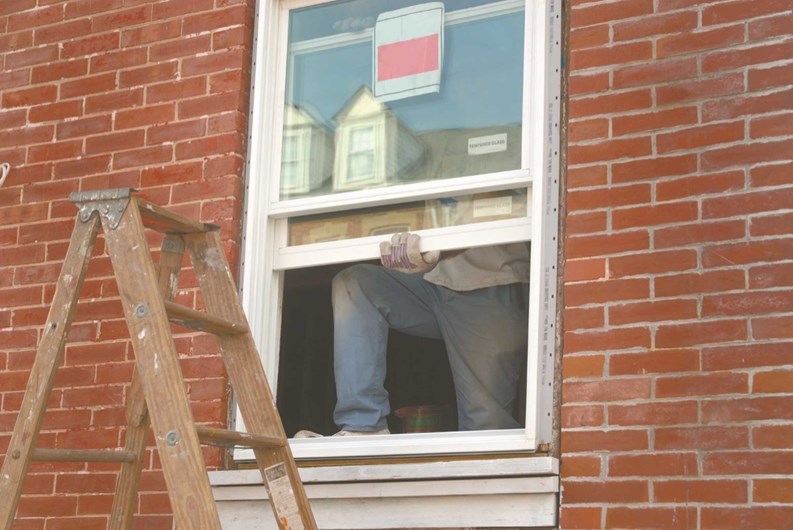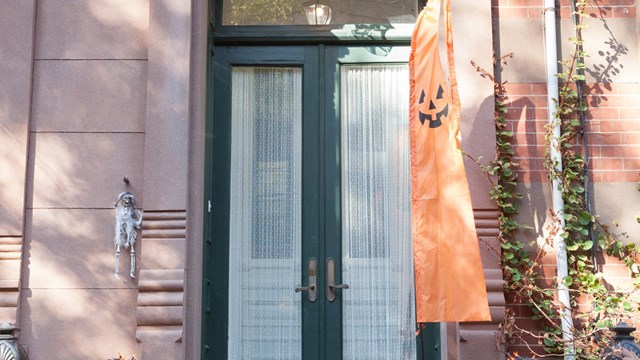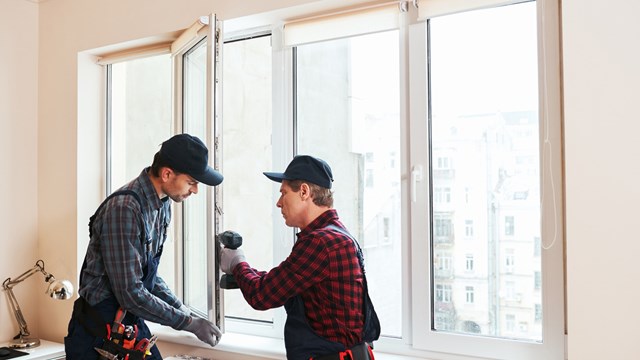Doing a major window replacement or repair project in a building or association that’s home to dozens, or even hundreds of people isn’t easy. There are any number of scheduling and access considerations, and time is obviously of the essence, as it’s impractical and unsafe to leave a gaping hole in someone’s wall for any length of time.
While most windows last for years, every building must, sooner or later, address a window replacement project. Let’s take a look at what you need to know about windows before it's your building's turn.
A Universal Element
Unlike green roofs or high-tech security systems, windows are something every operating residential building in New Jersey already has. Human nature and most HOA budgets being what they are however, if the panes aren't literally falling out of the frames, the tendency is usually to leave well enough alone. Why do we need new windows now, goes the question—can't it wait till next year?
Maybe not, if you're noticing certain red flags, according to Larry Landes, president of window manufacturer Renewal By Andersen’s Central & Northern New Jersey location. “It's not really something where people get up and say 'Gee, it would be a good day to replace my windows’,” he says. “When people are feeling drafts, if the windows don't operate properly, if they're painted shut or can't be opened, of if they're old, single-paned windows with no protection from UV light and peoples' furniture is getting faded and discolored as a result, it's probably time to think about new windows. Sometimes people just replace them for energy [efficiency.]”
And there are plenty of factors that contribute to the deterioration of windows, Landes continues. “Being in New Jersey, especially close to the shore, you have weather. There's salt air along the Jersey Shore, which plays havoc on wood windows. If there are several coats of paint over old windows, they won't operate. Wood may rot on the outside. If it's aluminum, the aluminum may corrode. Cheap vinyl windows may be installed by original builders, and it doesn't have a very long shelf life, so we replace vinyl windows that are three or four years old because they don't hold up with heavy duty usage. Those are just some of the reasons.”
Then there’s the question of how great your current window actually is, even if it doesn’t show outward signs of deterioration. In the Gold Rush of this decade’s real estate development, sometimes corners were cut where quality was concerned. If your development or building was built with sub-par windows, replacing those with more of the same quality hardly makes good economic sense. So, say the professionals, even if your development is relatively new, if your windows aren't up to snuff, it might very well be time for an upgrade.
Planning Before Execution
After determining that a large-scale window replacement project is a must in a building or HOA, the bulk of the work happens before the first new pane is installed. “There’s a lot of planning on the upfront side,” notes Dennis Gagne, vice president of commercial sales for national manufacturer Pella Windows.
Unlike new furniture for the lobby or new pool equipment, window repair and replacement isn't entirely based on what residents do or do not want. Sometimes there's no choice in the matter—but that doesn't give association administrators carte blanche to disregard resident opinion on a window project. Windows are an essential part of every apartment, and working on them requires more resident cooperation than most other projects. Thus it is essential that the unit owners a) grasp the necessity of the project, and b) like the new windows they're getting. Good communication on the part of the board and management in the run-up to the project is key here.
Of course, all the approval and support in the world won't pay for 100 new windows. Funding options for window projects largely depend on whether the windows are considered the responsibility of the association, or of the individual unit owner. “You have to go back to your bylaws,” Gagne says, and find out.
According to Rick Christenson, a vice president with Frost Christenson & Associates, an engineering consulting firm located in Bound Brook, responsibility for windows in a condo or HOA can vary depending on a number of factors. "In most cases, responsibility goes to the individual homeowners and it is not an association responsibility,” Christenson says. “On the other hand, there are some associations where the windows are covered." He concurs with Gagne that sometimes maintenance and repair of windows are included in an association's governing documents, such as the bylaws or the declaration of covenants, conditions and restrictions (CC&R).
In some cases, Christenson continues, an owner may cede responsibility for window replacement and repair to the association. "Sometimes the problems don't necessarily relate to the windows themselves," he says, pointing out that the window structure itself might be sound, but the area around it might be damaged.
There could be a chronic water leak through the wall, or flashing deficiencies around the window that could shift the responsibility for repair onto the association. But in order to determine jurisdiction for the repair, you have to determine the origin of the problem. Along with financial and procedural issues are structural and logistical ones. “In most cases, you need an architect or engineer to write a property spec, and then get a bid package,” says Gagne, who adds that it's also prudent to involve the shareholders in the process. “Show them the samples. Put prototypes in the super’s apartment. Once you're satisfied with the result, then go to bid.”
Gagne recalls one large development whose board made the unilateral decision to replace the windows, “signed the contract, and then showed the samples. The unit owners said, ‘No way. We don’t want those.’” This was, of course, a disaster. “You need to get buy-in from your residents,” he says. “Authoritarian boards don’t work well anymore.”
When looking at bids, it’s a good idea to look at other work a contractor has done, says Gagne. Visit other buildings where he’s done the window replacements. Check the references. “You might not go with the low bidder.” Only then is it time to move to the actual replacement part of the process.
Seeing Clearly
Step one in the actual installation process is the survey. “Every window must be measured,” says Gagne. This means that workers must have access to every apartment in the building or development. “It’s a very intrusive process,” which is why it's so vital to have residents on board with it from the start.
According to Henry Backer, president of Accurate Windows in Dix Hills, New York, the survey usually takes four to six weeks depending on the size of the association, and then it takes another six to eight weeks to manufacture the windows. After that, the actual installation is, in many ways, the easy part. If the HOA has adequate space, and administrators and residents are cooperative, contractors can send multiple crews to the site and can work very quickly if need be.
“Contractors can sustain a faster pace if the HOA can accommodate it,” adds Gagne. Typically, the workers spend two to three days in each apartment. The wild card is how many crews a building can have working at one time. But, while the process can be intrusive—you can’t install windows from the outside—good contractors know how to operate in those conditions. “Manufacture and installation, if you have a buy-in on the part of residents, usually goes really smoothly.”
Doug Weinstein, a regional director for Wentworth Property Management in Hackensack, agrees that cooperation among owners, managers, and contractors is the key to a relatively quick, pain-free window undertaking. In a large scale window replacement project, the property manager serves as sort of a project manager, coordinating with residents and contractors, attending job meetings, deploying personnel, and making sure all the necessary documents are in order. When responsibility for window replacement falls to the unit owner, the property manager will check that the proposed window conforms to all the aesthetics and guidelines set forth by the association. The manager must also verify that the hired contractor is fully insured and that his or her methods are in keeping with recommended practices for the building, says Weinstein.
And even though residents may look forward to having new windows, they still may be concerned about noise, dust, and drafts—and that comes back to the importance of a good communication system, the contractors say. Clearly outlining the nature and scope of the work being done is essential to setting residents' minds at ease and making the process as painless as possible. Some HOA administrators handle this via open meetings during which residents can ask questions and voice concerns; others provide residents with 48 hours notice of when contractors will need access to their unit. Checklists of things residents can do to prepare for the contractors can be very helpful as well.
Regardless of your association's budget and overall aesthetic, a window replacement project can be quite an undertaking—but if your windows are beginning to show their age and aren't up to the job any longer, waiting to replace them could cost you and your HOA thousands in increased energy bills and security risks. With some planning and plenty of good communication between board, management, and residents, your window replacement project can be a win-win situation for everyone involved.
Greg Olear is a freelance writer, novelist, and a frequent contributor to The Cooperator.







Leave a Comment